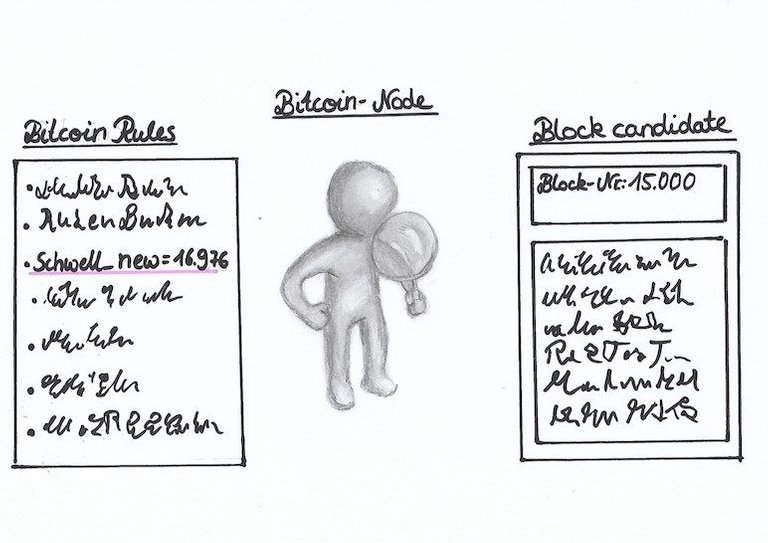
Note:
Gain a fundamental understanding of Cryptocurrency in an easy way. Before continue reading the story, I recommend to take a couple of minutes and read through the prior article again in order to refresh your present knowledge. The more often you read through the stories, the more confident you will get with the technology behind cryptocurrencies like Bitcoin. Take your time, to understand cryptocurrencies, as a Steemian it's worth it. The pictures are drawn by @RatzFratz, thanks for that!
If something in the story is not clear to you, don’t hesitate to ask. There are several people who might have the same question. So shoot me a comment, if something is unclear. Me and other readers will appreciate it
----
In the last episode we got to know what the Threshold of Bitcoin is. The Threshold is the limitation that a Block-Number of a Block-Candidate must be, in order to be accepted by the other Bitcoin-Nodes as a valid block.
The Threshold is responsible that only about every 10 minutes a "valid" Block is being created by the Bitcoin-Miners. Technically it takes only a fraction of a second to create a block. So without a Threshold there would be too much blocks created by all the miners and propagated through the Bitcoin-Network. All this blocks would also be legit, as long as they solely contain valid transaction. This speed of block-creation causes a problem:
All the Bitcoin-Nodes who send and receive new blocks with each other wouldn't have enough time between new arriving blocks to come to a consensus.
So the Threshold in this case newly defines what a "valid" block is (= Block-Number < Threshold) and thus artificially decreases the speed with which the miners are able to create a valid block. The goal of the limitation is to make the Bitcoin-network able to create one valid block roughly every 10 minutes.
Now we come to another problem: The Bitcoin-network is open for everybody. That means, that everybody can join or leave the Bitcoin-network with his allocated computation power. That means that the total amount of allocated computing-power in the Bitcoin-Network, which is used to create blocks, is variating all the time.
In order to keep the time-interval of roughly 10 minutes for each newly created block, the Threshold must be adjusted dynamically in relation to the total computing-power, allocated in the Bitcoin-network for creating new blocks.
Each Bitcoin-Node is adjusting its own Threshold after it attached 2016 valid blocks to its blockchain-register. As the planned time-interval between blocks is meant to be 10 minutes, each Bitcoin-Node expects that the time for creating the next 2016 blocks is 20.160 minutes(=10 Minuten x 2016 Blocks).
The mathematical formula for the calculation of the new Threshold is:
THRES_new = THRES_old x t / 20.160 minutes.
Once again: A Bitcoin-Node expects by default that after 20.160 minutes, 2016 blocks will be created and thus it will attach them to its own blockchain-register.
Example: The current Threshold(=THRES_old) is "23.000".
If now 2016 valid new blocks will be created within 10.000 minutes, the Bitcoin-Node will reduce its Threshold. The formula from above would be:
THRES_new = THRES_old x t / 20.160 minutes
THRES_new= 23.000 x 10.000 Minutes / 20.160 minutes
THRES_new = 11.408
Because of the new, smaller Threshold, it is now harder for the Bitcoin-Miners to create a new valid block, as the Block-Number now has to be smaller, because the Threshold decreased. This reduction of the Threshold will lead to the result, that now it will take longer to create the next 2016 valid blocks in comparsion to the former 2016 blocks.
Lets assume, it took 30.000 minutes for the next 2016 blocks this time. The formula now is:
THRES_new = THRES_old x t / 20.160 minutes
THRES_new= 11.408 x 30.000 Minutes / 20.160 minutes
THRES_new = 16.976
The Threshold increased. This will lead to the result, that now the next 2016 blocks will be created faster than the former 2016 blocks, where the Threshold was lower than the new one.

Have you stopped posting? Would like to see more articles from you!
Would also like to discuss blockchain applications. Do you have programming skills & experience/ very good understanding of the blockchain to make amendements where possible or to apply it beyond just digital currencies?
Congratulations @manonlescaut! You received a personal award!
You can view your badges on your Steem Board and compare to others on the Steem Ranking
Vote for @Steemitboard as a witness to get one more award and increased upvotes!